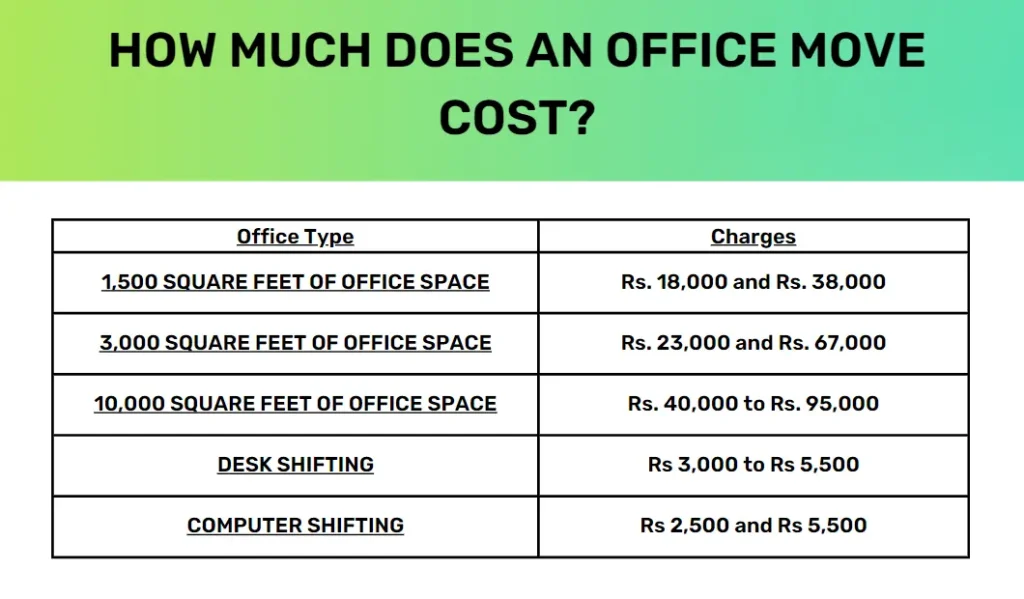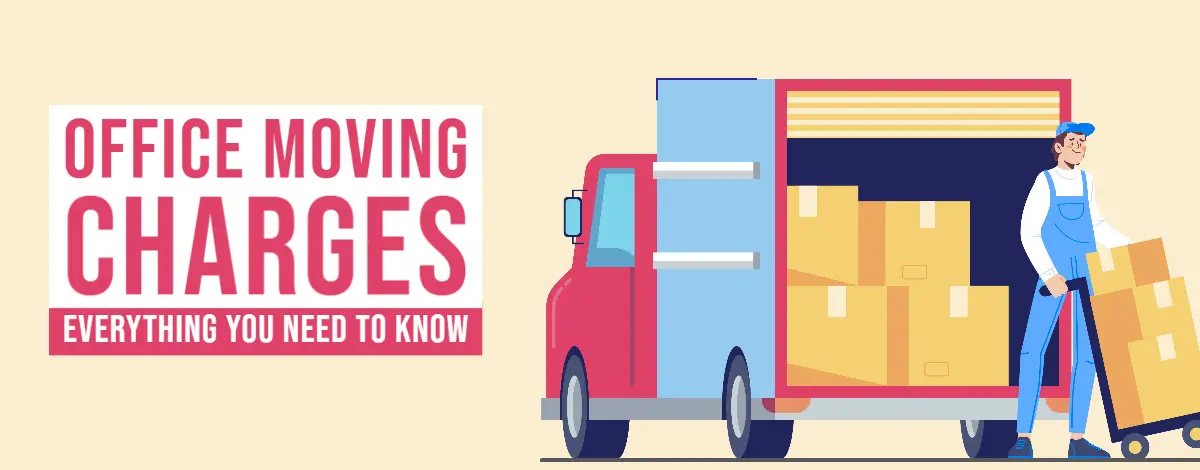Moving your office can be thrilling and intimidating. Shifting to a new place brings with it fresh possibilities and increases enthusiasm as the entire office anticipates a new stage. On the other hand, moving to a complete workplace can be intimidating since you worry about upsetting business and hurting your bottom line. However, careful planning and expert assistance can guarantee that business relocation is carried out effectively with the least number of problems.

In order to plan your office relocation smoothly, you should know and calculate the charge of moving your office.
Approximate Charge Of Moving The Office:
According to the supplies, dismantling, and furnishings, the price for relocating 1,500 square feet of office space could be anywhere between Rs. 18,000 and Rs. 38,000. According to your files and furnishings, packing and moving for a 3,000-square-foot area could begin at around Rs. 23,000 and go up to Rs. 67,000.
Due to the large number of staff and workplaces, a 10,000-square-foot area would probably cost between Rs. 40,000 to Rs. 95,000. Think of between Rs. 2,000 to Rs. 5,000 for every worker. It’s crucial to comprehend an interruption of those potential charges after taking note of the variables that can have an impact on the price of transferring your office. Though many of these expenses may apply to the relocation, not all of them will.
Keep in consideration that extra costs may arise for a shifting advisor, difficult lifts and long carry, wrapping and transferring cable, data lines, computer or telephone wires, and tipping your moving staff. A new desk might cost between Rs 3,000 and Rs 5,500 for each worker, a computer between Rs 2,500 and Rs 5,500 per worker, and a phone system between Rs 1000 and Rs 2,000.
Also Read: Do I Need to Provide Food for My Movers?
Plan Your Office Move Which Decides The Approximate Charge:
Moving companies with experience in the field would point out that shifting even the smallest of offices may be a difficult undertaking for a company owner, employees, and anyone concerned. However, shifting an office can have an impact on the efficiency of operation, make it difficult, and make unwrapping difficult for a business that just intends to settle in and get right back to its routine. If you’re relocating to a greater and more desirable location, keep in mind that having more room will likely allow you to broaden your business or find a better site.
When estimating the average price of moving an office, keep in mind that you must take into account the cost of the new location, the cost of hiring outside help, the possibility of making fresh orders of devices and furnishings, as well as any costs associated with lost revenue during the relocation.
Instead of considering the overall scale of your operations when planning your new location, consider the number of workstations required to meet the needs of your personnel. Think about how many workstations would require to be taken apart and put back together, or if you’d require purchasing new seats, tables, dinettes for the break room, or couches for the waiting area. You have to allot a budget for these too.
Also Read: How to Handle Last-Minute Movers Cancellation
Set up a workstation that allows you to spend when you move office:
Have you compared what you presently utilize for the internet and cable to the capabilities of the new space? If you have to switch networks, you can incur costs like early cancellation and start-up charges unless you can make the switch without too much difficulty.
Also, consider how much more you would have to pay for an office with a computer room for your internet requirements and a meeting space for conferences. Unless you have no other option than to buy new gear, you might wish to move your current hardware. You merely need to make sure that everything is taken care of prior to the big day if you intend to upgrade the devices you have.
Taking an expert moving crew into consideration. Some of the simpler duties can be delegated to your workers, but some offices might require a crew to tear apart, reassemble, bundle, and unpack. If you don’t have someone on your staff who can manually transport your devices and set up workplaces, think about hiring a specialist to prevent possible breakage or inconveniences.
Also Read: How A Moving Company Caters To The Unique Needs Of Senior Relocations
Factors that affect office relocation costs:
The price of transferring your workplace depends on a number of things. Your moving estimate might be significantly impacted by factors including the quantity of stuff you are moving and the distance traveled. Recognizing these contributing elements is crucial if you want to get a move at a reasonable price. However, the following fundamental details you should note them:
Building Size:
The number of objects being relocated will be one of the main variables affecting the cost of your move. Transferring to a tiny workplace with just a few pieces of things and some filing cabinets will be significantly less expensive than transferring to a big corporate office.
To guarantee you acquire the best moving calculation, you must organize and purge your office. To free up your filing cabinets and storage space, make an investment in a document protection strategy. Additionally, this can lower the cost of moving.
Date Range:
The peak period of the year for relocating is during the summer. The majority of companies opt to relocate on weekends or are compelled to do so by the landlord after business hours. Remember that moving during regular business hours could be less expensive than doing so after hours. Try to schedule your workplace relocation during the shoulder seasons, which are late September through April, to save money. Avoid vacations as well (overtime).
Distance Covered:
The expense of relocation may be impacted by the distance between your old and new offices. For corporate relocations, moving companies frequently use several fee structures. Others may charge by the weight of the objects being moved or by the hour.
In addition to these base fees, professional movers might also bill you for the distance they are anticipated to travel with your belongings. For example, a corporate transfer across the country will generally be more expensive than one locally. Your corporate moving company prior to the relocation day will provide you with a detailed evaluation and split of your costs.
Also Read: How to Prepare Your Employees for Office Move
Artworks:
You must inform your personnel in advance that they should remove any personal artwork from the walls or cubicles they may have and only return it once the job is over. Prepare to wrap and shift every piece of business artwork with the help of your expert movers to minimize responsibility.
You can significantly lower the expenses of supplies related to moving your workplace by enlisting the aid of your team and coworkers. It should be the responsibility of every staff member to pack and unpack their own workspace and personal belongings.
Withheld Details:
Keep in consideration that if you omit facts during your free estimate, your relocation bill could change dramatically. It is best to be open and truthful about every aspect of your corporate move so that you can get a thorough and reasonable quote. To guarantee you obtain an accurate quotation before your relocation, request the moving company for a list of the details you need to include, such as the number of furniture items, the date for the shift, or the distance to be covered.
Special considerations
Lastly, when shifting, don’t forget about any special considerations. Are there any unique chores that need to be finished while the transfer is happening? Do you need any services after your move? Will your business require office storage during or after the move? All of these are crucial inquiries that you must eventually consider from a financial standpoint.
Moving your company to a new site is a difficult task that needs careful planning. It involves more than just setting the time for moving in and out. It’s also not just a matter of picking the most modern corporate facility where you can draw in clients. Although moving can be expensive, costs can be controlled and reduced. Keep in mind to account for unanticipated expenditures such as repairs and construction needed in the new location when creating the budget for moving expenses. To get a more accurate calculation, ask moving companies for a quotation.
Also Read: What to Do if Your Movers Are Running Late
FAQs About Office Moving
Your personnel may feel more energized and enthusiastic about the business they work for after moving to a new location. A more pleasant place to work can be achieved by moving into a new workspace. A sleek, modern office is a fantastic method to display your company, brand, and the updated look of your enterprise.
1. Clearly, state your motivations for changing offices.
2. Make use of the office shifting checklist.
3. Remember your important dates.
4. Create a budget to control the expenses of office moving.
5. Inform your real estate agent.
6. Be careful when signing the lease for your office.
7. Begin preparing for your new office location.
8. Make an IT relocation strategy.
9. Select a company for your office relocation.
When you shift, the risk to your information, computer systems, and physical security increases.
Your company is vulnerable to danger, loss, and/or exploitation of information, personnel, and physical equipment when shifting offices. When moving, procedures are frequently broken, shortcuts are frequently discovered, and doors—whether they be physical doors or entry into IT systems—are left open more often than not.


